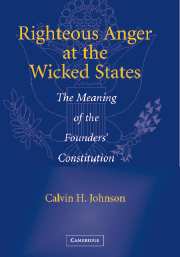Book contents
- Frontmatter
- Contents
- Acknowledgments
- Frequently Cited Sources
- Introduction
- PART ONE THE NECESSITY OF THE CONSTITUTION
- 1 The Rise of the Righteous Anger
- 2 Madison's Vision: Requisitions and Rights
- 3 The Superiority of the Extended Republic
- 4 Shifting the Foundations from the States to the People
- 5 Partial Losses
- 6 Anti-Federalism
- 7 False Issues: Bill of Rights, Democracy, and Slavery
- PART TWO LESS CONVINCING FACTORS
- PART III THE SPLIT AND THE END OF THE CONSTITUTIONAL MOVEMENT
- Concluding Summary
- Index
7 - False Issues: Bill of Rights, Democracy, and Slavery
Published online by Cambridge University Press: 27 July 2009
- Frontmatter
- Contents
- Acknowledgments
- Frequently Cited Sources
- Introduction
- PART ONE THE NECESSITY OF THE CONSTITUTION
- 1 The Rise of the Righteous Anger
- 2 Madison's Vision: Requisitions and Rights
- 3 The Superiority of the Extended Republic
- 4 Shifting the Foundations from the States to the People
- 5 Partial Losses
- 6 Anti-Federalism
- 7 False Issues: Bill of Rights, Democracy, and Slavery
- PART TWO LESS CONVINCING FACTORS
- PART III THE SPLIT AND THE END OF THE CONSTITUTIONAL MOVEMENT
- Concluding Summary
- Index
Summary
The critical issues of the ratification debate were whether power would be taken from the existing state governments and transferred to the new complete national government and whether the national government would be given the power over internal taxes for national defense. In context, other issues seem less critical. The ratification debate was not seriously about individual rights, nor about democracy or slavery. Individual rights, democracy, and slavery are intensely important issues, but they are not seriously implicated in the disagreements between Federalists and Anti-Federalists.
THE BILL OF RIGHTS
The Anti-Federalists tried to beat the creation of the new national government by finding serious abuses implied by almost every clause of the proposed text. Give Congress the power to raise armies, the Anti-Federalists argued, and it will “keep armies continually on foot,” and “billet them on the people at pleasure.” Give the federal government the power to make treaties and they would make a treaty to establish the Roman Catholic Church as the religion in the United States and make the Pope of Rome our President. Give the Congress the power to establish a Federal City, Anti-Federalists argued, and the federal government would make it a “sanctuary of the blackest crimes.” Give the federal government power over crimes and they “are nowhere restrained from inventing the most cruel and unheard-of punishments…. [R]acks and gibbets may be amongst the most mild instruments of their discipline.”
- Type
- Chapter
- Information
- Righteous Anger at the Wicked StatesThe Meaning of the Founders' Constitution, pp. 163 - 186Publisher: Cambridge University PressPrint publication year: 2005

